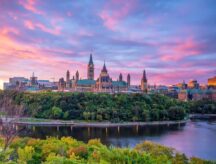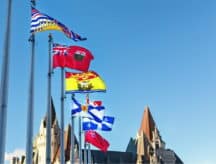Trudeau calls federal election: What does it mean for Canadian immigration?
Prime Minister Justin Trudeau has called a federal election for September 20.
Canadians have been expecting Trudeau to call an election for some time. In recent months, Trudeau's Liberal Party has been ahead in the polls, and the prime minister has been touring the country making funding announcements. Though the government does not legally need to have an election until 2023, polls suggest that support for the Liberals is high and it could be an opportune moment for Trudeau to try for a majority government.
Discover if You’re Eligible for Canadian Immigration
The Liberals lost their majority in 2019 and have led a minority government ever since.
A minority government means that the governing party does not have the majority of the Canadian Parliament's 338 seats and the party must work with other parties to create new laws.
The 2019 election resulted in parties winning the following number of seats:
- Liberals won 157 seats
- Conservatives won 121 seats
- Bloc Québécois won 32 seats
- New Democratic Party (NDP) won 24 seats
- Green Party won 3 seats
- An Independent candidate won 1 seat
The Liberals tend to sit on the centre-left of the political spectrum while the Conservatives sit on the centre-right.
Canada's COVID-19 situation has improved significantly in recent months. The country has the highest vaccination rate among the G20 and case levels have dropped rapidly since peaking in April. This has allowed provinces across Canada to re-open, resulting in a stronger recovery of jobs.
The promising pandemic outlook has also enabled Canada to relax its coronavirus travel restrictions.
Trudeau is seeking to harness this momentum to obtain another majority government. Having a majority enables the governing party to pass any laws of their choice without requiring support from opposition parties. Majority governments are more stable since they do not require opposition support to remain in power.
The parties will now head to the campaign trail as they look to convince Canadians to vote for them. They will also debate one another in English and French before a national television audience. Canadians will discover the final results on the night of the election.
Public opinion polls indicate the Liberals are currently in the lead followed by the Conservatives.
The 2015 and 2019 elections suggest there will be few changes to Canadian immigration policy over the coming months. During the election campaign and shortly after, the Liberals will remain in power and hence, their immigration policies will continue to be implemented by Immigration, Refugees and Citizenship Canada (IRCC) and other federal departments. IRCC will continue to pursue the Immigration Levels Plan 2021-2023, hold Express Entry draws, and process immigration applications.
Following the election, the new governing party will spend some time forming its cabinet. The Prime Minister will then provide ministers with mandate letters outlining the government's policy priorities. For now, the Canadian government is guided by the immigration mandate letters Trudeau has provided to Immigration Minister Marco Mendicino.
This process of the new government establishing itself will take us into the winter holidays which means it likely wont be until January that the new government finds their footing and begins to put their stamp on immigration policy.
If the Liberals win again, we can expect similar immigration policies as those they have pursued since 2015. The Conservatives also express strong support for immigration and oversaw higher immigration levels and the launch of Express Entry when they were last in power.
All of the political parties will be releasing their formal election platforms over the coming weeks which should give us more indication of what immigration policies they would pursue if they form government.
Discover if You’re Eligible for Canadian Immigration
© CIC News All Rights Reserved. Visit CanadaVisa.com to discover your Canadian immigration options.
- Do you need Canadian immigration assistance? Contact the Contact Cohen Immigration Law firm by completing our form
- Send us your feedback or your non-legal assistance questions by emailing us at media@canadavisa.com







